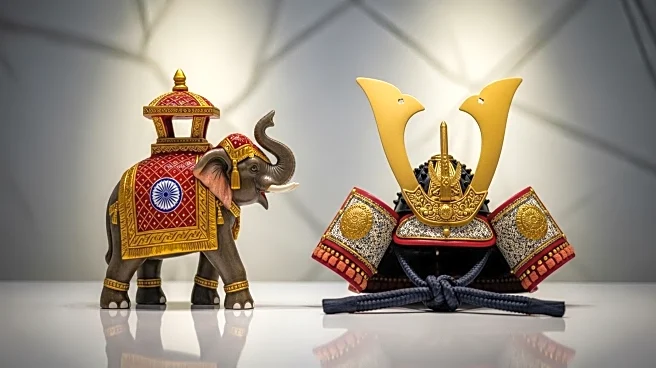What is the story about?
What's Happening?
Indian Prime Minister Narendra Modi and Japanese Prime Minister Shigeru Ishiba have agreed to enhance economic ties and cooperation in defense, clean energy, and other sectors. This agreement comes as both nations face challenges such as China's increasing influence and U.S. tariffs. During their summit in Tokyo, the leaders set a goal to increase Japanese private investment in India to $6.8 billion annually over the next decade, up from $2.7 billion in the 2010s. They also plan to facilitate exchanges of workers and students, aiming for half a million people over the next five years. The leaders released a joint vision for cooperation in areas like security, technology, and space, signing 11 documents to solidify their partnership.
Why It's Important?
The agreement between India and Japan is significant as it strengthens the strategic partnership between two major Asian economies, potentially countering China's growing regional influence. By increasing investment and cooperation, both countries aim to leverage their strengths—Japan's technology and India's workforce—to address mutual challenges. This collaboration could lead to advancements in clean energy, defense, and technology, benefiting both nations economically and politically. The partnership also supports the Quad framework, which includes the U.S. and Australia, promoting a free and open Indo-Pacific region.
What's Next?
Prime Minister Ishiba will accompany Modi on a bullet train to Sendai for a factory tour before Modi continues his Asia tour to China. The leaders' commitment to the Quad framework suggests ongoing efforts to counter regional tensions, particularly in the East and South China Seas. Japan's investment in India may lead to increased economic activity and job creation, while the exchange of workers and students could address Japan's labor shortages. The partnership's focus on technology and clean energy may drive innovation and sustainable development in both countries.
Beyond the Headlines
The deepening ties between India and Japan may have broader implications for global geopolitics, as both countries seek to balance China's influence. The collaboration could also impact the Global South and Africa, as Modi highlighted the potential for joint ventures in these regions. The emphasis on universal values like democracy and the rule of law underscores the ethical dimension of their partnership, promoting stability and peace in the Indo-Pacific.














